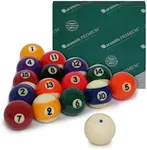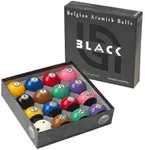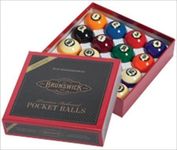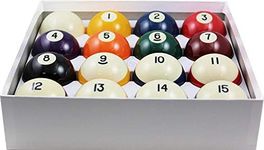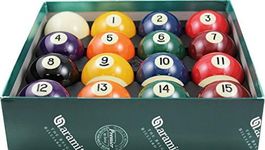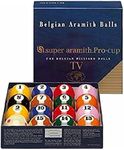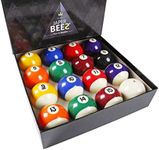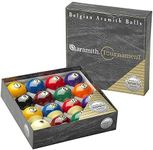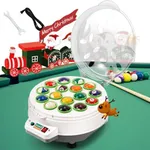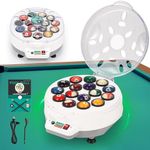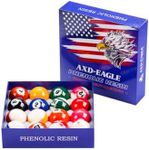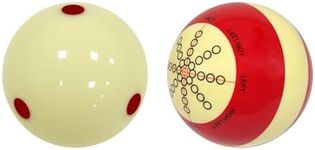Buying Guide for the Best Billiard Balls
Choosing the right billiard balls can significantly enhance your playing experience. Whether you're a casual player or a serious enthusiast, understanding the key specifications of billiard balls will help you make an informed decision. The right set of billiard balls can improve the accuracy of your shots, the smoothness of the game, and the overall enjoyment of playing. Here are the key specifications to consider when selecting billiard balls.MaterialBilliard balls are typically made from phenolic resin or polyester. Phenolic resin balls are more durable and provide a consistent roll, making them ideal for serious players and competitive play. Polyester balls are less expensive and may be suitable for casual play or beginners. If you play frequently or in a competitive setting, phenolic resin balls are a better choice due to their longevity and performance. For occasional play, polyester balls can be a cost-effective option.
SizeThe standard size for billiard balls is 2.25 inches in diameter for pool and 2.375 inches for snooker. The size of the balls affects the gameplay and the type of table you use. Standard-sized balls are essential for regulation play and provide a consistent experience. If you are playing on a standard pool table, ensure you choose balls that are 2.25 inches in diameter. For snooker, opt for the slightly larger 2.375-inch balls. Using the correct size ensures the balls interact properly with the table and each other.
WeightThe weight of billiard balls is standardized at around 5.5 to 6 ounces. Consistent weight is crucial for maintaining the balance and accuracy of your shots. Heavier balls can be more challenging to control, while lighter balls may not provide the same level of precision. For most players, standard-weight balls are ideal as they offer a good balance of control and performance. If you are a beginner, starting with standard-weight balls will help you develop your skills more effectively.
Color and DesignBilliard balls come in various colors and designs, with the most common being the traditional solid and striped patterns. The color and design of the balls can affect visibility and ease of play. Traditional designs are often preferred for their classic look and ease of identification during play. If you are playing in a well-lit environment, traditional colors and designs will work well. For themed or custom tables, you might consider balls with unique designs, but ensure they are still easily distinguishable during play.
FinishThe finish of billiard balls refers to the smoothness and glossiness of their surface. A high-quality finish reduces friction and allows the balls to roll more smoothly across the table. This can improve the accuracy of your shots and the overall flow of the game. Look for balls with a polished, glossy finish for the best performance. If you play frequently, investing in balls with a high-quality finish will ensure they remain smooth and perform well over time.

